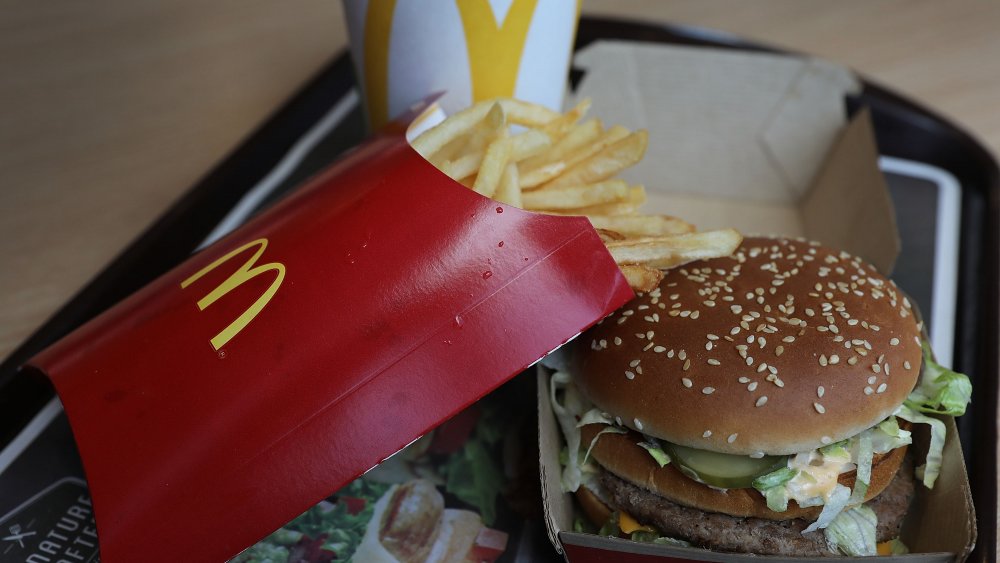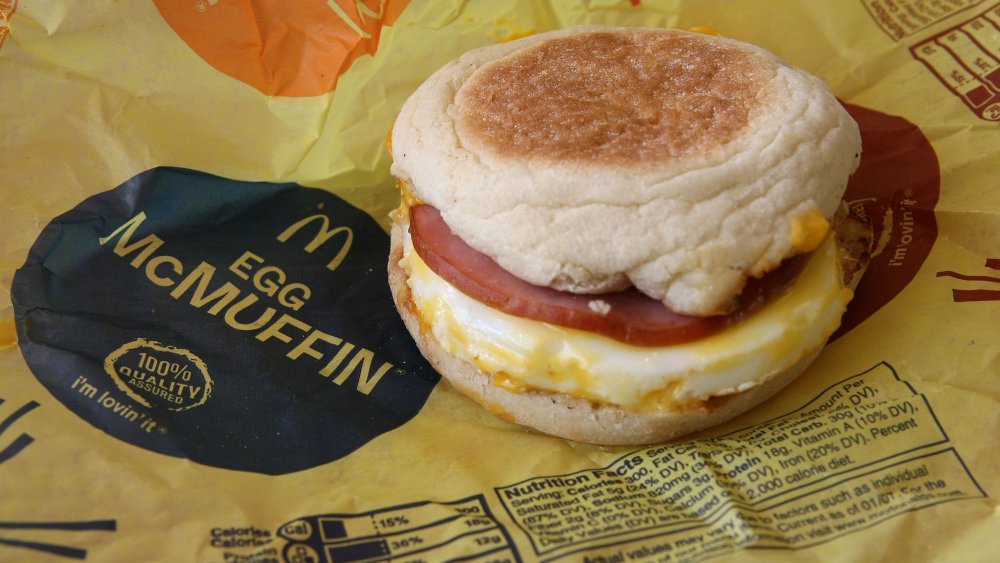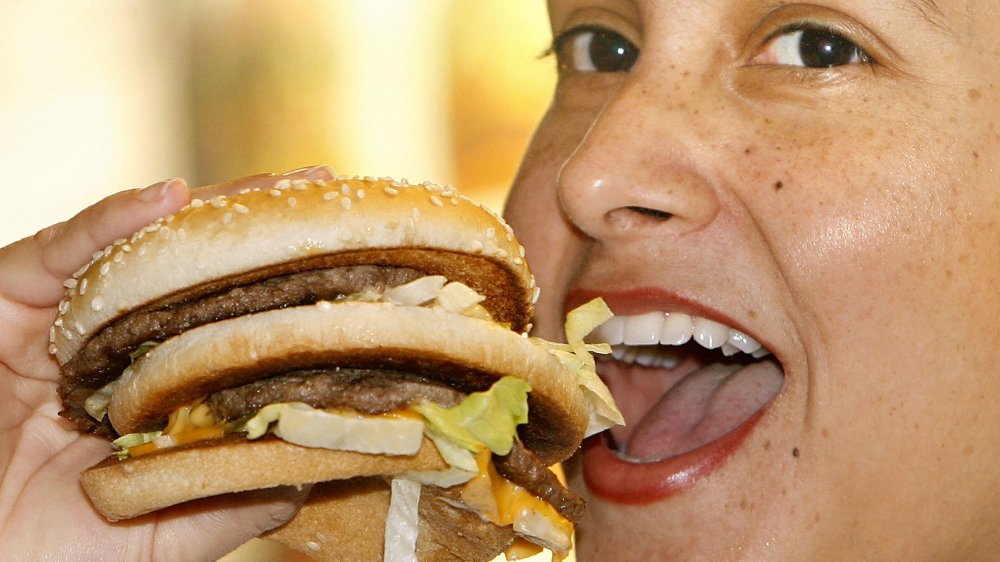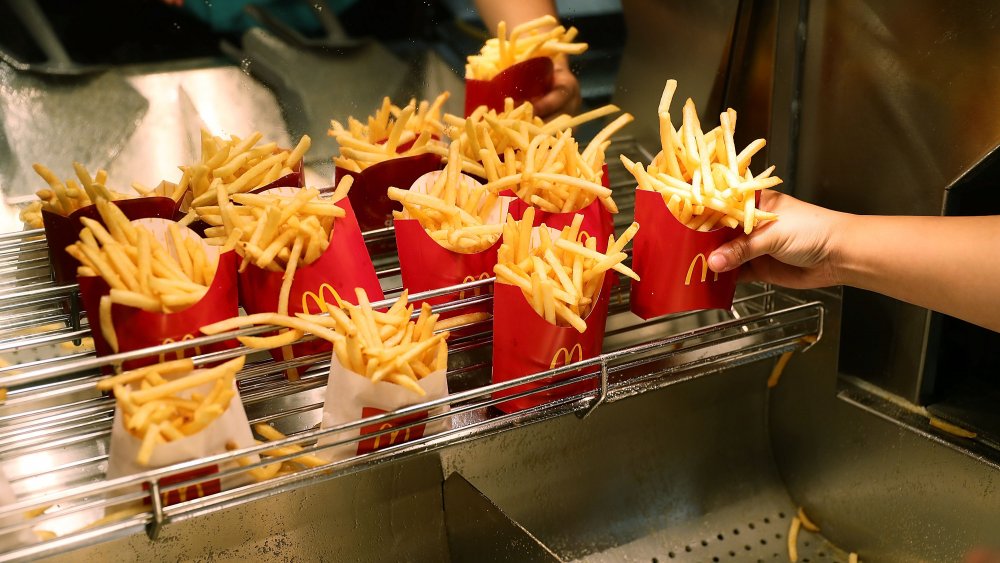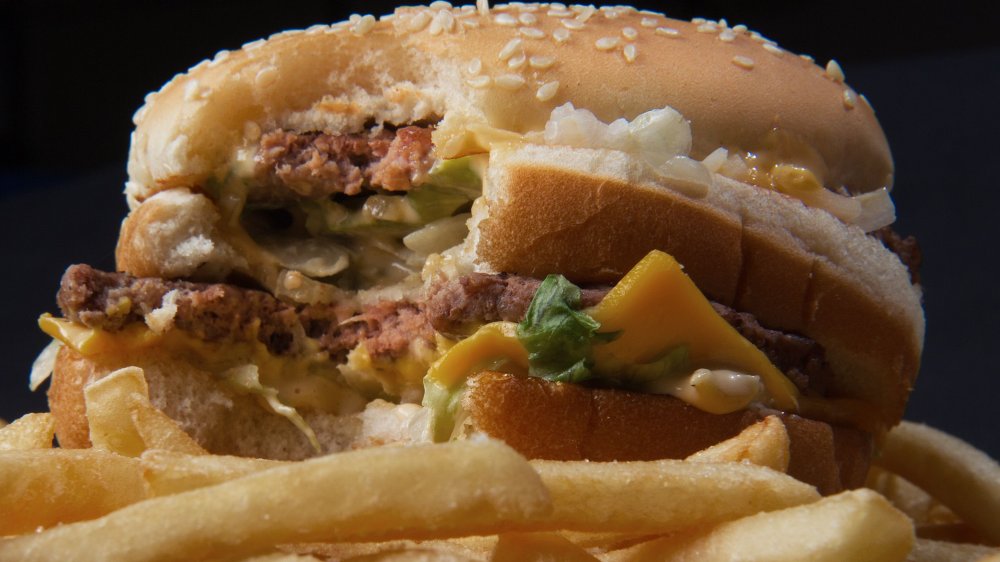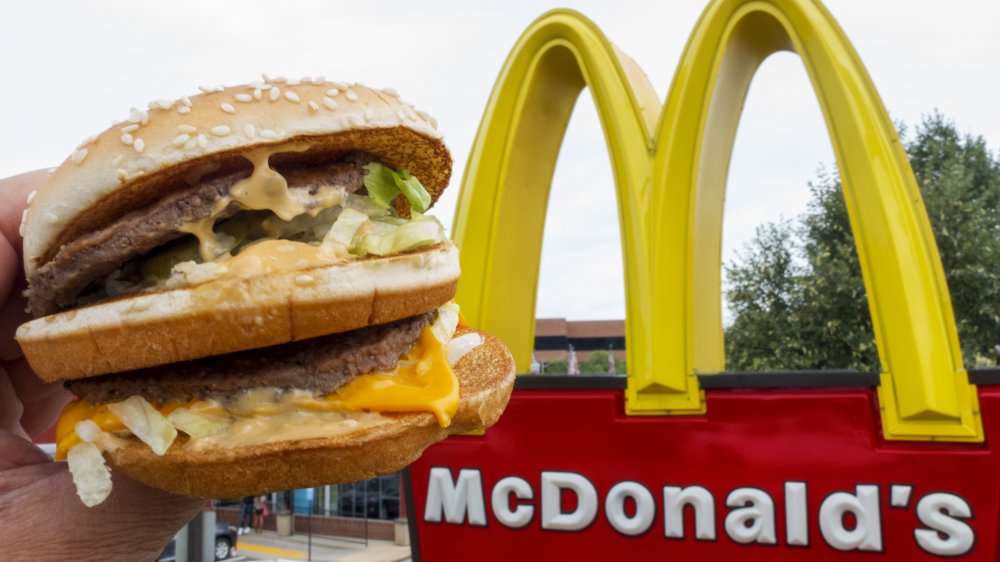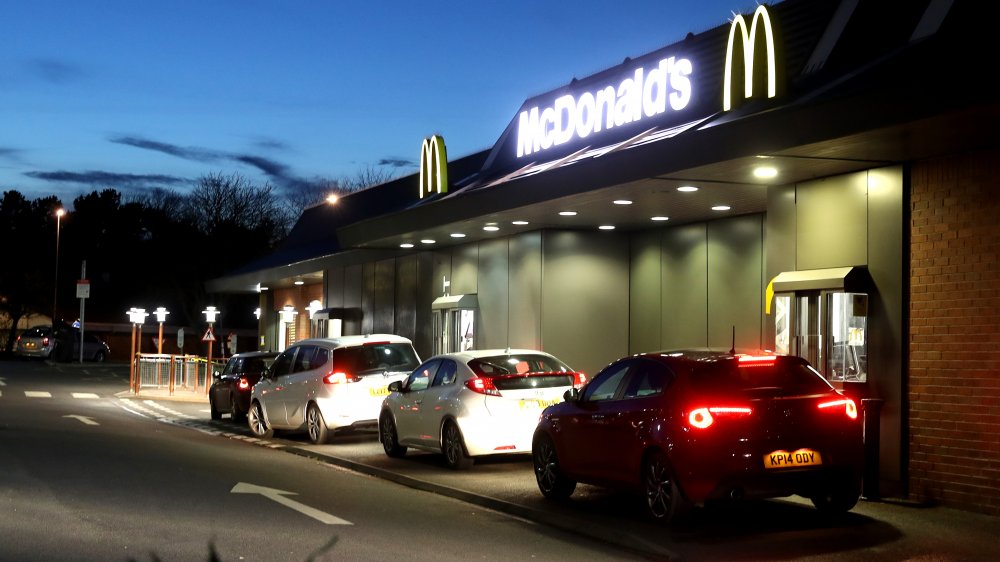What Happens To Your Body When You Eat McDonald's Every Day
There's a reason that McDonald's is found in so many cities all over the world: it's great. Looking for a quick lunch or snack while you're on the run? McDonald's. Craving some ice cream? McDonald's. Heading to pick up the kids from after-school practice, and need something to fill the void until dinner? McDonald's.
It's no secret that our lives can get pretty busy pretty quickly, and McDonald's can be a perfect solution. But, it's also easy to fall into the habit of swinging through the drive-thru for an Egg McMuffin and a coffee every morning, or a Big Mac on your lunch break. While it might be convenient... are there consequences?
The short answer is: Yes.
Keep up that daily McDonald's habit and you're going to see some changes in your body. Not all of them will be for the better, so let's talk about why you might want to keep your visits to McDonald's in the "occasional treat" category, instead of the "daily schedule" one.
It is possible to eat decently healthy at McDonald's
This is worth a bit of a disclaimer: It is possible to eat a somewhat healthy meal at McDonald's. Nutritionists talked to Shape about some of the better options there, and they said some do exist. For starters, ordering a hamburger without the bun, and getting a side salad to put it on — with a light dressing — is a good option, they say. The oatmeal's pretty good, and some of the salads at McDonald's can be decent... as long as you don't mind balsamic dressing or just a dash of the good (but high-calorie) stuff.
But it's safe to say that if you want to go super healthy at McDonald's, you're also super limited. And as an every-day option, well, we all know that's not going to happen, right? Even if you start with the best of intentions, it's just a matter of time before you splurge on a Big Mac, fries, and Coke, and it's all downhill from there.
So, we're not talking about what might happen if you stick to the handful of healthy things out there in this article. We're talking about the real world... and what happens when fry containers and burger wrappers start to build up in the back seat of your car. And strangely, "healthy" and "unhealthy" might not be too far apart when it comes to the impact McDonald's may have on your body.
You might just lose weight eating McDonald's every day
As unlikely as it sounds, there are people who have taken on eating at McDonald's every day as a sort of challenge, and proven that it's possible to lose weight.
In 2014, the Huffington Post reported that high school biology teacher John Cisna turned himself into a guinea pig for his students. They designed a menu where he would eat McDonald's for breakfast, lunch, and dinner for 90 days. At first, the menu was pretty healthy, but by the end, he was including things like Double Cheeseburgers. He stipulated that the students had to design his menu based on federal nutritional guidelines, and he added exercise to his schedule. By the end of 3 months, he'd lost 37 pounds.
He's not the only one who's done it. In 2018, a British postman decided to go on the McDonald's diet. After 30 days — during which he ate everything on the menu at least once — he lost 16 pounds. There's a huge caveat here, too — he also spent an hour at the gym every morning, and said that a non-sedentary career and his training as a bodybuilder probably helped him shed the weight. Bottom line? Dietitian Kara Landau told The Independent that just because one person had the lifestyle to do it, that doesn't mean everyone can (or should) try.
Even if you lose weight eating McDonald's every day, there are other things at work
Here's the thing: While people have demonstrated that it's possible to lose weight while eating just McDonald's, Business Insider says that McDonald's is still a horrible plan for getting healthy. As they put it, "Health is about more than weight."
While the pounds might come off, there are other things going on in a body that's getting nothing but McDonald's. That body isn't getting nearly the amount of other things it needs — things like fresh fruits and vegetables that help control blood pressure and prevent heart attacks and strokes. Skipping those can even make a person more prone to degenerative conditions like cataracts and vision loss.
It's also likely that along with the weight loss will come vitamin deficiencies, and that's going to impact things like bone health and your immune system. Wrap that up with the double whammy of a diet high in saturated fats and sodium, and even if you end up losing weight, you're still likely to suffer from some of the other not-so-positive effects of eating McDonald's every day.
Eating McDonald's every day might devastate your healthy gut bacteria
The more we learn about the little ecosystem of bacteria in our digestive tracts, the more we realize how important it is. According to Healthline, a balanced gut microbiome is crucial for things like managing our weight, and preventing conditions like irritable bowel syndrome. Your gut microbiome also impacts blood sugar levels, and helps the body absorb crucial vitamins and nutrients.
So, when a father-and-son research team found that eating McDonald's every day for just 10 days destroyed the gut microbiome, it was a big deal.
According to Time, professor of genetic epidemiology at King's College London Tim Spector recruited his son, Tom, a University of Aberystwyth genetics student, for an experiment. Tom would spend 10 days eating either McDonald's Chicken McNuggets or a Big Mac, along with fries and a Coke. They also say that after just three days, he started to feel... off. And, his skin started turning a little grayish.
By the eighth day, Tom wrote for The Telegraph, friends were getting concerned. He stuck it out, though, and along the way, he collected regular stool samples for testing in several labs. At the end of the 10 days, he found he had destroyed his gut bacteria. While he'd originally had 3,500 different species of microbes in his system, the McDonald's diet killed 1,400 of them. And that could cause a domino effect that impacts all those other parts of your body.
Eating at McDonald's every day can make you constantly tired
When Tom Spector spent 10 days eating nothing but McDonald's — for science! — he wrote for The Telegraph that things got tough around the third day and really, really hard by about day six. After eating, he would feel so sick that he'd have to sit down. And the tiredness and lethargy — the sort of feeling we associate with a post-Thanksgiving snoozefest — continued throughout the day, but at the same time, he couldn't sleep well.
Angus Stewart of Edith Cowan University says (via The Conversation) that there's definitely something food-related going on here. He says that research indicates that it's foods with "an imbalance of nutrients" that will make us feel most sleepy after eating them — particularly, foods that are high in carbohydrates and fats, but low in other things. Pretty much describes McDonald's, doesn't it?
Stewart says that when we eat a mean high in carbs, that signals our bodies to release an extra dose of insulin. In turn, that allows an amino acid called tryptophan — the same thing you've heard mentioned in conjunction with that Thanksgiving turkey — to enter the brain. Tryptophan goes on to be converted into serotonin, and that's what makes us feel sleepy. So, that fry-and-bun-heavy McDonald's meal is going to make you just as chronically sleepy as turkey day... without the good stuff.
Your sodium will go through the roof if you stop at McDonald's every day
According to the American Heart Association, you should aim for limiting the sodium in your daily diet to no more than 1,500 mg. Go over that, and you're at risk for all sorts of things like heart failure, high blood pressure, stroke, kidney disease, stomach cancer, and osteoporosis. And going to McDonald's every day is going to send your sodium through the roof.
Let's talk about some of the most popular items on the menu, and how much sodium we're talking about eating on a daily basis. A Big Mac, for example, has 1,320 mg of sodium, and if you grab just a medium fry with that, that's another 260 mg. You're over your limit! Think you'll do better ordering a salad? Their Bacon Ranch Salad with Buttermilk Crispy Chicken actually has more sodium: 1,480 mg. How about breakfast? A Sausage McMuffin with Egg comes with a hefty 830 mg.
The sodium content in some of McDonald's menu items is such a big deal that SFGate notes that worries about high sodium are right up there with the hefty helpings of fat and calories... so if you opt for lunch at McDonald's every day, you're putting more than your waistline in jeopardy.
You'll feel hungry and crave more food, even after your daily trip through McDonald's drive-thru
Does this sound familiar? You grab a Big Mac for lunch, and by early afternoon, you're hungry again. It just doesn't make sense... you just ate, but here you are, wanting to reach for the snack drawer. It actually makes a lot of sense — and according to Science Alert, it all has to do with what happens in your body after you eat a burger like the Big Mac.
For most people, the post-McDonald's hunger pangs kick in about 40 minutes after you finish your meal. What's going on? All the high fructose corn syrup in the burger — particularly, in the buns — causes a massive insulin spike. That lowers the amount of glucose in the blood stream, and essentially, that all means that your blood sugar levels are going haywire. In an attempt to compensate for that, you start craving something that's going to help your blood sugar even out — which is why things like that chocolate bar you've been saving for a special occasion start to look really, really good. You're basically craving more junk food to try to help your body do some damage control. That can't be good, can it?
The consequences of daily McDonald's will be visible on your skin
If you struggle with acne, you're not alone: Healthline says that around 10 percent of the world's population has the same struggle. When they took a look at the links between diet and acne, they found there was quite a bit of research out there that showed there was a major link between what you eat and how your skin looks. And there are quite a few options on the McDonald's menu that will turn your face into Breakout City.
Studies have found there's a link between refined carbohydrates — like the ones in soda and anything made with white flour — and acne. If you regularly eat foods with added sugars, you're at about a 30 percent higher risk of developing acne.
And fast food was in a category all of its own. Studies on teens and young adults linked fast food consumption with anywhere from a 17 to 43 percent increased risk of developing acne, while regular burger habit was linked with a 24 percent increased likelihood of acne in adult men. While they stress it's not exactly clear what's going on here, it does seem that there's a very real connection between your McDonald's habit and what you see popping up across your face.
Eating McDonald's every day will make you susceptible to diabetes and insulin resistance
A Quarter Pounder with Cheese Bacon has 14 grams of saturated fat, and 1.5 grams of trans fat. The Big Mac has a 10 grams of saturated fat and 1 gram of trans fat. Clearly, not great. So, what happens when you eat that kind of thing every day?
The Coronary Artery Risk Development in Young Adults Study (via NWH Journal) consisted of were 3,031 participants, and they participated in regular dietary assessments. Even when adjusting for other lifestyle habits, those who ate at fast food restaurants more than twice a week showed "a twofold greater increase in insulin resistance," which is one of the major risk factors for both diabetes and heart disease.
Healthline says that what those Quarter Pounders are doing is essentially filling you with unnecessary fats and sugars. That's adding extra pounds, and that's leading to cells that are becoming more and more resistant to insulin — the hormone that shuttles sugars around your system. Your pancreas is forced to produce more and more insulin to do the same job, until you finally wear out the whole system and you're finally diagnosed with high blood sugar and ultimately, diabetes.
Your digestion will slow down when you eat McDonald's every day
Ever finish off an Extra Value Meal and then pause to think about how many regrets you had? It's no secret that McDonald's can leave you feeling bloated, crampy, and uncomfortable, and that's because there's something going on with your digestive tract.
According to Healthline, fatty, greasy foods are the ones that take the longest for the body to process. That means the food you're eating sits in your stomach for a longer-than-normal amount of time, and if you've ever doubted just how greasy McDonald's is, take a look at the state of those burger wrappers. Plus, if you're already prone to things like cramps and diarrhea, eating regularly greasy meals can make those symptoms much, much worse.
Now, here's something truly horrifying, courtesy of Science Alert. They say that there's so much grease and fat in a Big Mac that it can take more than three days to completely digest and pass out of your stomach. (And for comparison, the Mayo Clinic says that on average, food should take around six to eight hours to pass through your stomach and into your small intestine.) So, one of the things that's happening to your body is that it's laboring — for days — to process that Big Mac. So eating it every day is really going to start to take a toll.
Eating McDonald's every day might make you want more McDonald's
Way back in 2003, the BBC reported on a Princeton University study that researchers said proved fast food was "as addictive as heroin." That's a bold claim, so what's going on here? Are we getting addicted to a daily McDonald's habit?
Yes, says Psychology Today. At the heart of the matter is sugar. They took a look at McDonald's menu, and after noting that everything from the ketchup to the burger buns has sugar in it, they shared how it keeps people craving more... with the help of some rats. Sugar was found to trigger the pleasure centers of the brain, and after spending some time in sugar-fueled happiness, they ate more and more sugar. When it was taken away, the rats went into withdrawal — and researchers say that our brains can get dependent on sugar in the same way.
And there's another thing that McDonald's does to our brains — it makes us happy in a nostalgic sort of way. Ever get Chicken McNuggets because you remember them from when you were a kid? Brain scans done by the Baylor College of Medicine have shown that when we're presented with something we're fond of, the region of the brain that forms memories — the hippocampus — lights up with glee. McDonald's — and years of fond memories — is actually stimulating your brain in a way that keeps you coming back for more... whether you know it or not.
You're more likely to struggle with depression if you eat at McDonald's every day
Does what you eat have an impact on your emotional well-being? Yes, according to a joint study from the University of Las Palmas de Gran Canaria and the University of Granada (via Science Daily).
When they looked at how much fast food a person ate and how likely they were to develop depression, they found that risk for depression increased right along with fast food consumption. Even their baseline was very telling: compared to participants who ate little or no fast food, those who did stop at their chain of choice on a regular basis were 51 percent more likely to run the risk of depression.
That's not the only study to confirm such a link, and in 2018, the journal Molecular Psychiatry (via The Guardian) published the findings of researchers who compiled the results of 41 different studies that looked at the links between mental health and diet. Bottom line? The regular consumption of fast food led to what's called "systemic inflammation," which is inflammation that impacts the entire body. That, in turn, impacts the neurotransmitters that regulate our mood and over time, this can make drive-thru regulars more susceptible to depression. Links were so strong that it led to them suggesting that dietary counselling should become a regular part of sessions with mental health professionals.
